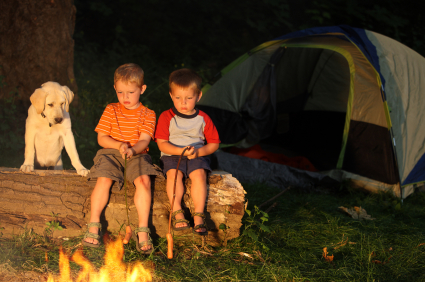Camping with your dog
By Catalogs Editorial Staff

Going camping with your dog is a great way to bond with your pet!
You. Your dog. Maybe a few friends and their dogs. A tent, a campfire and the great outdoors.
What could be better than camping with your dog?
We started taking our dog on camping trips when she was just a puppy. Mostly it was great, but we had to learn a few lessons along the way.
If you’re new to camping with dogs, there are some tips that can make it better for everyone. We had to learn the hard way, but you can learn from our successes and our mistakes. So before you grab the tent and head out, read on.
Check your location for rules about dogs
Many would-be campers have had to learn the hard way that some campgrounds don’t welcome dogs. Before you pay a deposit, buy a map or head out for the site, check and double check the rules.
Even sites that allow dogs may have rules about size, numbers of dogs per site, dog leash lengths, vaccines and pet waste disposal, so it pays to be prepared from the start.
~
Opt for a site with more space between you and other campers
All it might take is an unfamiliar smell in the air, or the confinement of the tent or the scent of food from the next campfire and suddenly your normally quiet and well-behaved dog is howling or barking. In a remote location, it will only affect you and your camp-mates.
But if campsites are close together, you could find yourself the recipient of a lot of unpleasant shouting. You could even be forced to pack up and leave in the middle of the night if a ranger gets wind of the noise.
Yes, it might mean a longer walk to facilities or the trail head, but the security of knowing you won’t have to cut your trip short or dole out lots of apologies is well worth the extra distance.
Pack the right things — now is not the time to skimp!
Traveling light when you’re camping can be a wonderful thing, but when you have a pup along, you need to make sure everything you need is on hand. Some of the must haves for a dog camping trip include:
- A sturdy 6′ leash (and an extra one, just to be safe)
- A dog collar with a good clasp (or a harness for Bully breeds who tend to back out of collars)
- An ID tag with the dog’s name, your name and your cell number
- Vaccination records, including the vet’s phone number
- Food and water bowls (add a collapsible set if you’re going to do any hiking)
- Your pet’s favorite kind of dog food. Bring extra in case of spills or unplanned sharing with other dogs!
- Bottled water – a gallon per day per dog for a large dog. About half that for a smaller one
- Dog treats
- A couple of inexpensive dog toys. Things tend to get lost on camping trips so leave the pricier dog toys at home.
- A towel or two to wipe off muddy fur and paws
- A dog bed. My dog is happy with one that rolls up like a sleeping bag, while my sister’s dog prefers the off-the-ground kind of dog bed that looks like a little trampoline. Try them out at home to see what your dog likes best.
- A couple of good photos of your dog in case he or she wanders off
- A small lock for the zipper on the tent flap if you have an escape artist
- A tie down or peg and a lead to keep your dog in the camp site when you’re busy cooking, setting up or whatever
- The name and number of a vet and the animal shelter/animal control nearest your campsite
- A life vest for your dog if boating is in the plan
- A dog brush for a quick clean before getting back in the car (and to remove any burrs or leaves during the trip)
- Doggie waste bags (bring extra, just in case!)
- A dog first aid kit, including bandages, a tick removal set and any medicines they need
- A lightweight, collapsible dog crate
Try it at home
If your dog has never been camping before, it’s a good idea to set up the tent in the yard and let them explore. Consider camping out for the night in the yard with them, and let them try their camp bed, travel crate and other new items in a familiar space.
If you’re planning on camping with other dogs your pup doesn’t know, try to arrange some play time together in a dog park or other low-stress setting before you go. That may help to minimize stress and head off the aggression that can come from new dogs in a stressful environment.
Make sure they’re micro-chipped!
This is a hard and fast rule for anyone considering taking a dog camping. A tag can fall off. A collar can be lost. And if your dog disappears far from home, that microchip might be their only way home.
Even well-trained dogs can wander off in the wilderness, so make sure there’s a way for someone to bring them back home to you.
Enjoy!
Camping with a dog is wonderful. With a little preparation and a bit of extra packing, you can create a memorable, fun experience for both of you.
Popular Savings Offers











